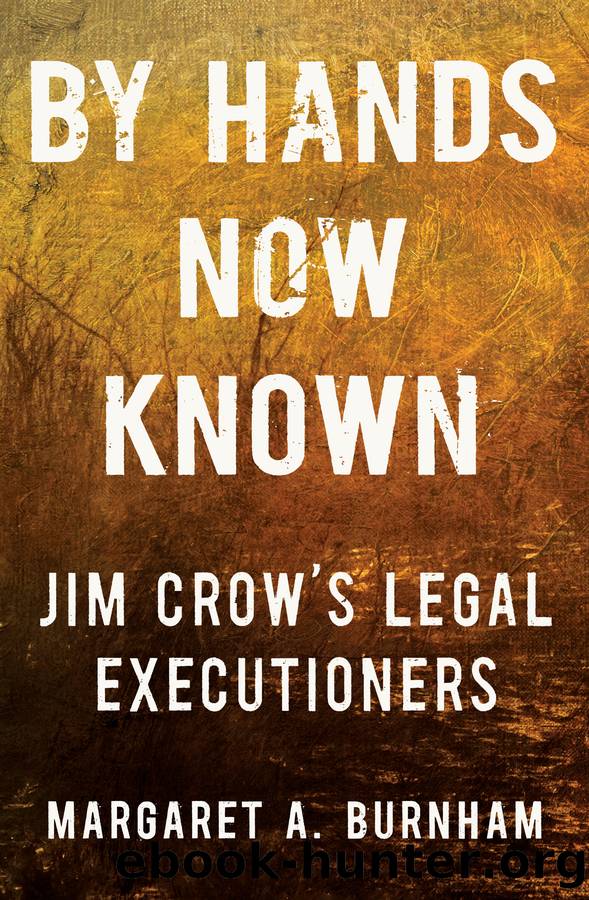By Hands Now Known by Margaret A. Burnham

Author:Margaret A. Burnham
Language: eng
Format: epub
Publisher: W. W. Norton & Company
Published: 2022-08-20T00:00:00+00:00
ULTIMATELY, the most challenging bar to effective enforcement was not structural but ideological. Whereas the tenacious confederate âstatesâ rightsâ narrative outlived its usefulness in other arenas of federal law enforcement, it defined, confined, and realigned civil rights initiatives until the late 1960s. Insurance fraud, tax evasion, antitrust, labor law, and kidnapping all became subject to enhanced federal policing and enforcement. But not civil rights crimes, even though they often involved interstate activity, as with the festival-style lynching that drew mob participants from neighboring states looking for some macabre excitement. Although in the 1930s the Great Depression gave rise to the labyrinthine bureaucracy that some disparagingly term âthe deep stateâ and a pro-federalist understanding of constitutional arrangements, Washingtonâs politicians and government lawyers alike still deemed civil rights criminal enforcement to be the province of the statesâand their county sheriffs.
For Black people whose constitutional rights were nullified, it was irrelevant whether arcane, outdated, and ahistorical theories of federalism, or the remixed âOur Federalism,â or winner-take-all two-party politics explained their abandonment; abandoned they were. Festering beneath the long shadow of the Rebel defeat was an abiding antipathy for all directives on race matters emanating from Washington that simply would not be uprooted by the New Federalism of the Roosevelt era. Southern politicians eagerly embraced Rooseveltâs federal farm relief programs, highway construction, and social security, but hoisted the statesâ rights flag on all matters involving race.
In the 1943 prosecution for police brutality, the case of Walter Gunn, the lawyer representing the defendant, Alabama sheriff E. E. Evans, argued to the jury that Section 52, the federal statute criminalizing official civil rights violations, was âa Reconstruction measure passed by a vindictive government.â In apparent agreement, the jury acquitted Evans.
Download
This site does not store any files on its server. We only index and link to content provided by other sites. Please contact the content providers to delete copyright contents if any and email us, we'll remove relevant links or contents immediately.
| Civil Rights | Discrimination |
| General | Human Rights |
Day by Elie Wiesel(2252)
The Age of Genius by A. C. Grayling(2177)
Gideon's Spies: The Secret History of the Mossad by Gordon Thomas(1956)
The Gulag Archipelago (Vintage Classics) by Aleksandr Solzhenitsyn(1733)
FATWA: Hunted in America by Pamela Geller(1726)
Columbine by Dave Cullen(1505)
Examples & Explanations: Administrative Law by William F. Funk & Richard H. Seamon(1334)
Men Explain Things to Me by Rebecca Solnit(1324)
The Rule of Law by Bingham Tom(1323)
Anatomy of Injustice by Raymond Bonner(1273)
Three Cups of Tea by Greg Mortenson(1264)
ADHD on Trial by Michael Gordon(1247)
That Every Man Be Armed by Stephen P. Halbrook(1244)
Gideon's Spies by Gordon Thomas(1219)
Palestinian Walks by Raja Shehadeh(1145)
The Source by James A. Michener(1140)
Fast Times in Palestine by Pamela Olson(1123)
Nothing to Envy by Barbara Demick(1045)
Constitutional Theory by Carl Schmitt(1042)
